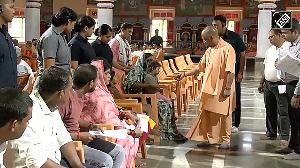Harkishan Singh Surjeet, the pragmatic Marxist leader, who played a key role in keeping the Bharatiya Janata Party out of power in 1996 and helped the Congress form a coalition government at the Centre eight years later, died in Noida on Friday after a prolonged illness.
Ninety-two-year-old Surjeet, who was convalescing at the Metro Hospital in nearby Noida since July 25, breathed his last at 1335 hours, Communist Party of India-Marxist general secretary Prakash Karat told PTI.
The former party general secretary was earlier admitted to the hospital on May 6 following a severe cardiac arrest. He slipped into coma on May 16. He fought back and was discharged on June 3.
Dr Purushottam Lal, chief of Metro Hospital, told PTI that Surjeet died of a cardiac arrest.
"Surjeet suffered a massive heart attack today," Dr Lal said giving the reasons for his death.
The 92-year-old leader had been suffering from fever and lung infection along with loose motions. "He gradually developed septicaemia due to persistence pneumonia resulting from low immunity, poor general condition and advanced age," Dr Lal said.
"He was on ventilator and other support systems. Since Thursday his urine output was low. His condition was critical and chances of survival were low," he said.
The veteran Marxist leader had been suffering from lung and kidney problems over a period of time and was hospitalised several times because of recurrence of lung and urinary tract infections.
Along with another veteran Marxist Jyoti Basu, Surjeet had played a major role in guiding Congress president Sonia Gandhi in the aftermath of 2004 elections to bring together secular forces.
History turned full circle, as by the time of his death, the CPI-M had withdrawn support to the Congress-led coalition at the Centre and become a staunch opponent of the ruling party on the issue of Indo-US nuclear deal.
During the reply to the trust vote on July 22, Prime Minister Manmohan Singh had paid glowing tributes to the "visionary leadership" of Surjeet and Basu in the formation of the government and its continuance for four years.
Despite his Communist background, Surjeet was a consummate player of the democratic political game and was instrumental in the formation of three coalition governments at the Centre.
At the height his anti-Congress days, he along with the Bharatiya Janata Party in the pre-Babri Masjid demolition days, helped V P Singh form the National Front government in 1989.
Later, he took outside support of Congress to form the United Front government to keep BJP out of power in 1996.
Ultimately, again he was in forth-front when he brought forth a coalition of parties to help Congress form a government at the Centre in 2004.
Born on March 23, 1916, in Jalandhar, Surjeet started his political career in the national liberation movement in his early teens as a follower of Bhagat Singh and joining his Naujawan Bharat Sabha.
On the anniversary of Bhagat Singh's martyrdom, Surjeet was shot twice by the British police for hoisting the Indian tricolour atop a court in Hoshiarpur. Later, he underwent a jail term.
In court, he stated his name as London Tod Singh (one who breaks London).
In 1936, he joined the Communist Party of India. When the party split in 1964, Surjeet sided with the CPI-M as one of the nine founder members. He remained its politburo member from 1964 and became the general secretary from 1992 to 2005.
With his declining health, Surjeet was, for the first time, not included in the politburo at the party's 19th Congress in April-May this year. He was designated as special invitee to the central committee.






